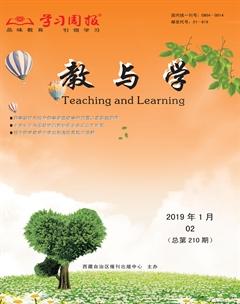淺談高中英語詞匯教學的有效途徑
曾麗娜
摘 ?要:本文主要論述了英語詞匯在第二語言學習中的重要性和一些能提高學生英語詞匯能力的教學途徑。英國語言學家George W.W ilkins在《語言教學中的語言學》一書中指出:“沒有語法,表達甚微;沒有詞匯,表達為零。”這句話說出了任何一個英語學習者都知道的常理:沒有合適的詞匯,要實現正常的語言交際那是不可能的。因為,一個人掌握詞匯的深度與廣度,直接影響他的語言表達能力。由此可見,詞匯在整個語言學習領域中所占的重要地位。那么,作為一名高中教師,想要較好英語這一學科,就應不遺余力地努力提高學生的英語詞匯能力,下文將淺談實現這一目的的一些有效途徑。
關鍵詞:詞匯 ?主體求知欲 ?英英字典 ?猜詞 ?詞匯訓練
1. 刺激學生對英語詞匯的主體求知欲。
曾經在教學法的書中讀到過這樣的一個句子“A word is most likely to be learned when the learner feels a personal need to know it.”有的時候,學習者能自己感覺到很有必要去學習某些詞的意思因為這些詞對理解某個有趣的或者重要的內容起到關鍵性的作用。也有時候,是因為學習者自身很想為了某個目的要表達自己,這時,他也強烈的感覺到學習詞匯的重要性。比如說,某個人讀了一個星像圖,內容如下:“ People who were born on July 3rd are generous and extravagant. They are usually very popular with members of the opposite sex. They are easy to love them. Although artistic and creative,they have certain faults. They are sometimes obstinate and often gullible.” 如果這個讀者正是出生于7月3日,而他又不認識這幾個詞:extravagant,obstinate,和gullible,那么他是很有可能主動積極地去查字典并學會這幾個詞,而且一旦學習了這幾個詞的詞義后,他也印象深刻,不易遺忘。在高中英語的課程中,教師要有意識的選擇使用適當難度的材料提供給學生,當學生感受到這種認識新詞的自我需要時,他們的主體求知欲會帶來高效的詞匯學習成果。
2. 培養學生使用英英字典的能力和習慣。
關于英英字典對英語詞匯學習的幫助那是眾所周知的事。可是,作為二外的學習者,學生們總是說不習慣使用,或者說看不懂詞義解釋,以至于即使查了字典,還是沒有解決生詞的問題。所以,作為一名英語教師,要正確的引導學生使用好英英字典。首先,要重視字典的例句。字典的例句經過編纂者的精挑細選,非常具有代表性,教師上課要舉例,讓學生一起反復讀,甚至摘抄并且背下來。其次,用英英字典查熟詞。如果閱讀中遇到生詞,量又比較多,可以允許學生使用英漢字典,但是遇到自己比較熟的單詞,就要鼓勵學生查查英英字典,看看和以前背的中文解釋有什么不同。最后,要讓所有的學生養成讀字典的好習慣。許多文學家都提到過平時要閱讀字典,平時也很難找到像某本教材教輔能象權威字典那樣經過那么多人認真編纂、經過那么久的時間考驗書。學生們如果都能重視英英字典的作用,使用好這個英英字典工具,相信他們的英語詞匯水平會有很大幅度地提高,尤其是在詞匯的正確使用方面會有很大的收益,這對于在高考英語試卷上的得分是非常重要的。
3. 培養學生高效的猜詞能力
做為教師,如果能培養起學生“以舊猜新”的能力,那學生的詞匯能力會更上一個臺階。比如,學生已經知道enjoy的詞義,他們就很有可能推測出enjoyment,enjoyalbe,enjoyably等詞的含義。條件是學生們知道-ment,-able,-ly等詞綴的語法功能。事實上,認識語法功能的詞綴有兩個重要的作用。其一,學生們對英語文本的理解程度會得到很大的提升,因為他們可以通過“生詞”中已經“熟悉”的那部分推測出全詞的意義,從而消滅了這個“生詞”。其二,學生們自己生成的英語句子需要這樣的詞綴來確定詞性。否則,他們很可能會生成這樣的錯句:“That was a very enjoy party.” 通過詞綴的幫助只是培養學生猜詞能力的方法之一,教師們還可以通過語境,語篇結構等其他途徑的訓練,來實現目的。
4. 組織學生進行有效的,真實的詞匯使用訓練
詞匯學習的終極目標是能夠實現英語的“聽,說,讀,些”四大功能。由于高中英語教學以閱讀課為主,所以,對詞匯的生成性運用經常都會被師生們有意無意的忽略掉。下文就介紹一些以真實交際為目的的詞匯交際活動。
- paraphrases and summaries
Students are asked to express—in simpler and briefer form—the main dieas of an article or an essay,orally or in writing.(To do so,students must learn words from the original article and slao obain other words for expressing the dieas in sentences of their own.)
- Group Compositions
The class is organized into small groups. All groups are assigned the same topic(some topic that makes use of the students own experrience,like “bicycle safety” or “how to study for an examination”). Working together,the members of each group compose a paragraph or two on the assigned topic one member writes the composition as the others dictate it. Two or three of the compositions are then copied on the blackboard. They are chosen by the teacher,who was walked around observing the wrok and given help as requested.
- A wall newspaper
Members of the class contibute articles and other items to a “newspaper” which is taped to the classroom wall. The newspaper should have a name(such as “Classroom Times”)and an editor and several reporters. It should be “published” at frequent and regular intervals. In addition to news,various sections of the paper might include sports items,pictures,cartoons,social notes,advertisements,editorials,recipes,advice on teenage problems,letters to the editor,and other features commonly found in newspapers intended for speakers of English.
- Situational and functional dialogs
Whether or not there are opportunities for using English with native speakers of the language,the class can be engaged in imagined or simulatd experiences that require the use of English. Students should be asked to write and then to present totheri classmates various kinds of dialogs. The chief aims of the activity are to encourage students to discover how much they can say in English,and to show students what remains to be learned. When students have confidence in their ility to use English,they find ways to continue learning beyond the certain textbook.
總之,詞匯教學是個任重而道遠的教學內容,師生們都有對這個內容予以足夠的重視并不斷研究和實踐有效的方法,這樣才會取得良好的教與學的成果。
參考文獻:
[1] Jim Scrivener:Learning Teachng:A Guidebook for English Language Teachers. Macmillan Heinemann,1994
[2] David Nunan:Research Methods in Language Learning. Cambridge University Press,1992

